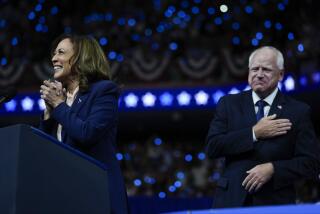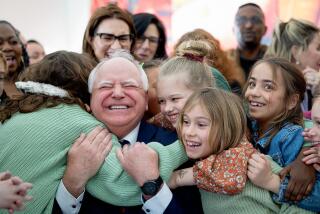GOP GUMBO JUMBO
- Share via
NEW ORLEANS — A presidential candidate should consider five things when picking a running mate. The first: Pick some one who will help you win. The other four aren’t worth mentioning.
In short, there is only one question now on George Bush’s mind: “Who is going to help me get elected President?” Bush has at least 20 Republicans to choose from. Each can do something for him. But none can do more than one thing. And only one of them is likely to give Bush what he needs most--a stronger personal image.
Michael S. Dukakis was luckier. When he picked Sen. Lloyd Bentsen of Texas as his running mate, he was helped in two ways. With Bentsen, Dukakis boosted his chances of carrying Texas, a state with 29 electoral votes. That made Bentsen a smart choice. Dukakis also enhanced his personal image; he looked stronger and more independent by choosing someone entirely different in style and substance. “So what if we differ on taxes, abortion rights and Contra aid?” Dukakis seemed to say. “I don’t need a ‘yes man.’ ” In other words, Bentsen was also a bold choice.
As Dukakis likes to point out, John F. Kennedy did the same thing when he picked Lyndon B. Johnson in 1960. LBJ was a Texan. In fact, he controlled the powerful Texas political organization now run by Bentsen. In 1960, as in 1988, Texas was crucial for the Democrats. In addition, Johnson was Kennedy’s chief rival for the nomination, different in style and substance. Choosing Johnson made Kennedy look stronger and more secure. “So what if Johnson is Senate majority leader and has a rival power base?” Kennedy seemed to say. “I can keep him under control.”
Bush can make either a smart choice or a bold choice. But it’s hard to see how he can do both.
If Bush decides to go for electoral votes, the choice should be Gov. George Deukmejian of California. Dukakis cannot win without California’s 47 electoral votes. But Deukmejian has taken himself out of the running. He wrote Bush a letter saying, “I cannot be considered . . . . It would mean turning the entire executive branch of the nation’s most populous state over to the Democratic Party.”
Too bad. Deukmejian is a white ethnic, and he has a tough law-and-order image. Bush could use a little ethnicity and more than a little toughening up. Could Deukmejian be pressured into reconsidering? Probably, if the President went to him and said the Reagan legacy is at stake. But to put Deukmejian on the ticket now would look like an act of desperation. A presidential nominee should not have to beg.
There are two other big-state governors who could help Bush: James R. Thompson of Illinois (24 electoral votes) and Thomas H. Kean of New Jersey (16). Thompson and Kean are highly compatible with Bush and that’s the problem. They’re too compatible. They are both moderate Republicans with strong Establishment roots. They don’t change Bush’s image; they reinforce it.
The choice of Thompson or Kean would also drive the right wing of the Republican Party crazy. Among other grievous sins, both fail the GOP litmus test on abortion: They are pro-choice. Remember that Bush is planning to delay naming his vice president until near the convention’s end. Otherwise the GOP convention could be like last month’s Democratic convention--12,000 reporters and no news. If Bush names a running mate unacceptable to the party’s right wing, he may lose control of the convention floor. That is something Dukakis never did. A convention these days is essentially a stage show, and it is risky to improvise.
The right wing of the party is pressuring Bush to name Rep. Jack Kemp of New York or Jeane J. Kirkpatrick. Both would energize the convention. But what good would they do in the long run? If Bush is having problems with conservatives, they offer no solution. Kirkpatrick is a renegade Democrat with suspiciously moderate views on domestic issues, while Kemp did not inspire much of a following in GOP primaries this year. Only one politician can rally the Reagan base in the GOP--Reagan. He has to go out and campaign for Bush in California, Florida and Texas to keep conservatives in line.
Bush’s big problem is not with conservatives but with Democrats. Like Reagan, Bush needs support from crossover Democrats to win the election. Kirkpatrick has a talent for setting Democrats’ teeth on edge. There is a theory that Kemp appeals to blue-collar Democrats because of his career as a football player and his gung-ho economic ideas. There is as yet no evidence for that theory.
Only one potential running mate demonstrat ed significant crossover appeal: Until he left the presidential race, Sen. Bob Dole of Kansas was the first choice for the GOP nomination among Democrats. But how could Bush put Dole on the ticket? Dole was Bush’s principal rival and critic during the primaries. Dole’s personal attacks on Bush are there on videotape, for all to see.
That is precisely why Dole is the best choice. He would do more than any other running mate to enhance Bush’s personal image. Putting his chief rival and critic on the ticket would be a bold move. Bush would look tougher and more secure. It would say the same thing about Bush that the selection of Johnson said about Kennedy and the selection of Bentsen said about Dukakis: “I can tolerate someone different from me, even someone critical of me, because I have confidence in myself.” That kind of self-confidence is what the vice president needs to turn his campaign around.
But can Bush trust Dole to be loyal? That is one reason why Bush needs him. Everyone knows that Bush values loyalty. The problem is he seems to value it too much. He has been so conspicuously loyal to Reagan that many voters wonder whether Bush is his own man. By choosing Dole, Bush would be devaluing loyalty. He would be saying, “I am not so insecure that I have to have someone on the ticket whose loyalty is blind.” That, too, is something Bush needs to say.
Dole has presidential ambitions of his own, of course. No one can imagine that he wants to spend the next four or eight years being Bush’s vice president. In fact,one could argue that if Dole got on the ticket, it would be in his interest for the ticket to lose. That way, Dole would have an open shot at the 1992 GOP nomination.
But Dole could never do anything to sabotage the Republican ticket. It would ruin his own presidential prospects. That almost happened in 1976, when he was Gerald R. Ford’s running mate. A lot of Republicans feel that Dole’s slashing performance may have cost Ford the election. Dole dare not be seen as poisoning the ticket a second time.
In fact, Dole has a loyalty problem of his own. One reason Democrats like him is that he has not been overly loyal to Reagan. On such issues as the budget deficit and the Iran-Contra affair, Dole has been one of Reagan’s sharpest critics. That is why Dole lost the GOP nomination: He had the taint of disloyalty.
In recent weeks, Dole has seemed surprisingly eager to be on the ticket--because he needs to prove his loyalty to fellow Republicans. By subordinating himself to Bush, Dole can dispel suspicions that clouded his 1976 and 1988 campaigns.
Only one other candidate could help Bush as much--Mrs. Bob Dole. She is a woman, and Bush has a problem with women. They don’t like him. The reason is that Bush is a Reaganite, and women are hostile to Reaganism. Women do, however, rather like Reagan. Bush offers Reaganism without Reagan, and that is a tough sell for women. Elizabeth H. Dole would not make Bush’s gender-gap problem disappear. But she would help.
Elizabeth Dole is no token. She has executive experience and a national reputation--unlike another recent female vice presidential nominee. She is also a Southerner, which could help now that Bentsen is on the Democratic ticket.
The main problem with choosing Elizabeth Dole is she is married to Bob Dole. If he wants the job, how do you give it to his wife? Conversely, if Elizabeth Dole wanted the job, it would be difficult to give it to her husband. Before Bush destroys the ultimate Washington marriage, the Doles are going to have to decide which of them should have the job. So far, it appears that Mrs. is deferring to Mr.
Of course, Bush could make other choices. But they are one-dimensional. Howard H. Baker Jr., the former Senate majority leader and White House chief of staff, commands respect among Washington insiders but no longer has any electoral base outside Washington. There are some Southerners he could choose--Gov. Carroll A. Campbell Jr. of South Carolina, former Gov. Lamar Alexander of Tennessee. But they hardly have regional reputations, much less national ones.
Sen. Alan K. Simpson of Wyoming? A great wit. Sen. Pete V. Domenici of New Mexico? An Italian-American. Gov. John H. Sununu of New Hampshire? He could do a number on his neighboring governor. Sen. John McCain of Arizona? A former Vietnam prisoner of war.
Does it make much difference whom Bush chooses? Not really. In past elections, tickets usually end up gaining a few points in the vice presidential candidate’s home state. In a close election, of course, a few points in one state can make a big difference. It did for the Democrats in Texas in 1960 and could again in Texas this year.
Americans vote for President, not for vice president. The selection of a vice president is important because of what it says about the presidential candidate. Dukakis said something important when he put Bentsen on the ticket. This week, when Bush announces his choice, we’ll see what he has to say.
More to Read
Get the L.A. Times Politics newsletter
Deeply reported insights into legislation, politics and policy from Sacramento, Washington and beyond. In your inbox twice per week.
You may occasionally receive promotional content from the Los Angeles Times.










